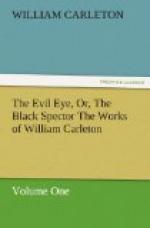“That is a case I must take in hand,” returned the son. “I shall go to Ballyspellan and put an end to her. After that we can meet old Cockletown with courage. I feel that I am a favorite with his niece, and she, you must have perceived, is a favorite with him, and can manage him as she wishes, and that is one great point gained—indeed, the greatest.”
“No,” replied his mother, “the greatest is the death of Alice Goodwin.”
“Be quiet,” said her worthy son; “that shall be accomplished.”
CHAPTER XVII. Description of the Original Tory
—Their Manner of Swearing
We have introduced an Irish outlaw, or tory, in the person of Shawn-na-Middoque, and, as it may be necessary to afford the reader a clearer insight into this subject, we shall give a short sketch of the character and habits of the wild and lawless class to which he belonged. The first description of those savage banditti that has come down to us with a distinct and characteristic designation, is known as that of the wild band of tories who overran the South and West of Ireland both before the Revolution and after it. The actual signification of the word tory, though now, and for a long time, the appellative of a political party, is scarcely known except to the Irish scholar and historian. The term proceeds from the Irish noun toir, a pursuit, a chase; and from that comes its cognate, toiree, a person chased, or pursued—thereby meaning an outlaw, from the fact that the individuals to whom it was first applied were such as had, by their murders and robberies, occasioned themselves to be put beyond the protection of all laws, and, consequently, were considered outlaws, or tories, and liable to be shot down without the intervention of judge or jury, as they often were, wherever they could be seen or apprehended. We believe the word first assumed its distinct character in the wars of Cromwell, as applied to the wild freebooters of Ireland.
Tory-hunting was at one time absolutely a pastime in Ireland, in consequence of this desperate body of people having proved the common enemy of every class, without reference to either religious or political distinction. We all remember the old nursery song, which, however simple, is very significant, and affords us an excellent illustration of their unfortunate condition, and the places of their usual retreat.
“I’ll tell
you a story about Johnny Magrory,
Who went to the wood
and shot a tory;
I’ll tell you
another about his brother.
Who went to the wood
and shot another.”
From this it is evident that the tories of the time of Cromwell and Charles the Second were but the lineal descendants of the thievish wood kernes mentioned by Spenser, or at least the inheritors of their habits. Defoe attributes the establishment of the word in England to the infamous Titus Oates.




